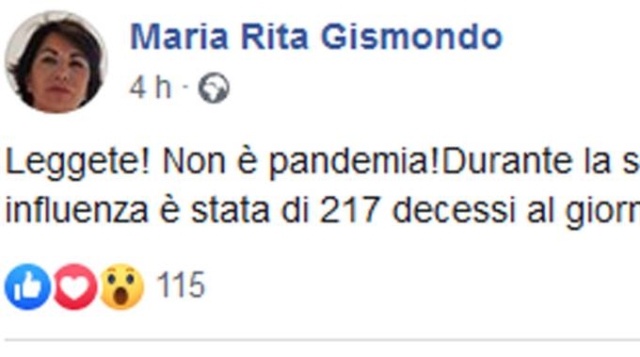COVID-19 latest: Don’t ‘panic’ says EU health chief as cases climb faster than China
Europe must not “give in to panic” over the spread of COVID-19, the EU’s health commissioner warned on Wednesday as countries scrambled to contain the biggest cluster of infections outside Asia.
Greece and Brazil confirmed their first coronavirus cases, a day after the virus spread to Switzerland, Austria, Croatia and mainland Spain — and the WHO announced more new infections outside China than inside for the first time.
“This is a situation of concern but we must not give in to panic,” Stella Kyriakides said in Rome. “We must also be vigilant when it comes to misinformation and disinformation as well as xenophobic statements which are misleading citizens and putting in question the work of public authorities.”
The Greek health ministry said a 38-year-old woman in Thessaloniki, who had recently travelled to Italy, tested positive for the virus. People who came in contact with her are voluntarily entering quarantine.
In France, the French health ministry said a 60-year-old local man had died overnight, becoming the first French citizen to die. Previously, an 80-year-old Chinese tourist had died in Paris.
Meanwhile, a COVID-19 patient is in critical condition in Germany and authorities in Austria placed an apartment complex in the southern town of Bad Kleinkirchheim under quarantine after the death overnight of a 56-year-old woman from northern Italy.
As the Coronavirus pushes across Europe and Middle East In Lombardy’s quarantined towns, paranoia is spreading faster than any virus.
The 11 towns, home to some 50,000 people, are closed off from the outside world. Police officers and the military are manning checkpoints at all access roads; nobody can enter or leave.
In this so-called red zone, life is on hold. But even in the yellow zone — the area around the quarantined towns where people are free to leave but have been advised to remain indoors — the streets are deserted and silent. All schools, restaurants, bars and most shops are shuttered; carnival parades were cancelled, and churches have suspended Mass.
Prime Minister Giuseppe Conte called for calm and less sensationalist reporting on Tuesday.
“It’s time to turn down the tone, we need to stop panic,” he said, according to Italian newspaper La Repubblica. The paper added that he had asked the chief executive of public broadcaster Rai to tone down its reporting of the virus.
He also sought to reassure the public who are worried about school closures and food running out, after panic buying led to empty supermarket shelves in some towns.
“Panic is a completely unjustified reaction that compromises the overall efficiency of the system and triggers regrettable speculations on the prices of some products,” Conte told the Corriere della Sera newspaper Tuesday.
“The food supply will be ensured with appropriate measures especially in the ‘cluster’ areas. Calm is brought back through punctual and transparent communication,” he said.

A woman walks in an empty Italian supermarket after a massive rush to buy water, food supply and soaps.SOPA Images
The virus has affected all aspects of Italian cultural life, from the early shutdown of the Venice Carnival to the closure of churches. On Wednesday, the Vatican announced that it was shutting all the catacombs open to the public for the time being, as the humidity and limited space in the underground burial sites favored the spread of the virus.
Tensions are running high; the price of face masks and sanitising hand gels has skyrocketed and the government is so worried about misinformation that Foreign Affairs Minister Luigi Di Maio is reportedly preparing an international plan to combat “fake news” about the outbreak in Italy. “There are too many fake news out there,” Di Maio said in the Council of Ministers Tuesday.
Maria Rita Gismondo, director of the microbiology of the Sacco hospital in Milan called it all crazy.
Prominent virologists have suggested the virus is only slightly more severe than regular influenza but media coverage has fed alarmism. “This craziness will be very harmful especially from an economic standpoint,” Maria Rita Gismondo, who heads a unit at Milan’s Sacco hospital analysing thousands of coronavirus tests, wrote on Facebook.
Milan, February 23, 2020 – “She swapped an infection just more serious than an influenza for a lethal pandemic . It’s not like that.” Maria Rita Gismondo, director of the microbiology, virology and diagnostics of bio-emergencies department of the Sacco hospital in Milan, the center of reference for contagions in Lombardy, says it on her Facebook profile . “Our lab churned out exams all night. Samples are constantly arriving: it seems crazy to me,” notes the doctor in the post.

Maria Rita Gismondo goes on to say in her blog “Look at the numbers. This madness will hurt a lot, especially from an economic point of view,” appeals the head of the hospital, who describes the environment in the analysis department: “My angels are exhausted . ” Finally a message of tranquillity: “I run to bring them breakfast. Today my Sunday will be at the Sacco. Please, turn down your tone !”. “Read! It’s not a pandemic! Influenza mortality has been 217 deaths a day over the past week! For Coronavirus 1 !”

Italian soldiers and police have set up checkpoints in the region to control access | Francesca Brunati/EPA
But still we fear and the world quakes at each new case.
Iran is scrambling to contain a coronavirus outbreak that is threatening to spin out of control. Lack of transparency and poor infrastructure are combining to create perfect conditions for the virus to spread.
Cases of coronavirus are continuing to increase in Iran, with the country’s health authorities on Wednesday reporting 44 new cases and four new deaths in 24 hours. The total number of cases in Iran currently stands at 139. Nineteen people have died so far from the virus.
Iran has porous borders with countries that have very poor medical infrastructure. International health officials are concerned that a coronavirus outbreak in the country could quickly spin out of control and create a new epicentre for an outbreak in the Middle East.
Like some scene from a Zombie apocalyptic film live on TV people witnessed in horrified fascination the Iran’s health minister who later tested positive after sweating profusely during press conference.
Iranian President Hassan Rouhani said on Wednesday that the coronavirus must not become a “weapon” for “shutting down” the Iranian economy, which is already battered by sanctions.
Rouhani also accused Iran’s “enemies” of trying to spread fear in the country. Rouhani admitted that it may take “one, two or three weeks” to get the virus under control.
On Tuesday, US Secretary of State Mike Pompeo accused Iranian authorities of concealing the truth about the outbreak from the Iranian people.
The Iranian government has set up a committee led by government spokesman Ali Rabiei to inform the public about the coronavirus.
Although schools have been closed across the country, and the government has asked people to stay at home, Rabiei warned Iranian media against turning the outbreak into a political issue.
However, videos shared on social media are showing poorly supplied and overrun hospitals. There are reports that coronavirus test kits are running out.
A recession in the making
Global markets continuing to slide. Health authorities in the United States warning that it was a matter of when, not if, the virus would invade American shores. A toxic political climate in Washington complicating the public health challenge.
That worrying drumbeat frayed nerves across the world on Wednesday even as the pace of the outbreak seemed to be slowing in China.
The latest evidence suggests that consumers are largely unfazed by recent coronavirus developments. Consumer confidence ticked up slightly in February from a downwardly revised January level, according to the Conference Board.However, that could change quickly given the latest headlines on the coronavirus, and the steep drop in the stock market from its all-time highs.
The Dow plummeted more than 1,000 points Monday, something that has only occurred two other times in history. On a percentage basis, it was the market’s worst day in two years, reflecting how ill-prepared investors were for bad news.”If the market keeps going down 1,000 points a day, that will spook people very fast,” said Zandi, the Moody’s economist.
Investors are hoping that the Federal Reserve will once again come to the rescue with easy money. Markets are now pricing in a 78% chance of at least one interest rate cut by the June Fed meeting, according to the CME Fed Watch Tool. That’s up from just 28% a month ago.Unfortunately, central bankers are ill-equipped to fight pandemics.
The pan-European Stoxx 600 provisionally closed slightly below the flatline, paring some earlier losses. Travel and leisure stocks were the worst performers, down more than 2%.
On Tuesday, a top U.S. health official said the coronavirus will likely become a global pandemic.
Anne Schuchat, principal deputy director of the Centers for Disease Control and Prevention, told reporters that, “It’s not so much a question of if this will happen any more, but rather more a question of when this will happen.”
For the first time, more new cases have been reported outside China than inside, according to the World Health Organisation. The number of new cases reported in China on Tuesday was 411; in the rest of the world, the number was 427. The total number of cases globally has now reached 80,980 and nearly 3,000 have died.
In the European Union, which prides itself on its open borders among member nations, new cases were recorded in Austria, Croatia, France, Germany, Greece and Spain. Most were tied to Italy, where the authorities have been struggling to contain an outbreak that has infected at least 325 people, most of them in the north near Milan.
British hospitals have Coronavirus pods outside entrances

WHO chief Tedros Ghebreyesus said the number of new COVID-19 cases around the world on Tuesday was 427 compared to only 411 inside China, where the outbreak began.
He said there were new cases linked to Iran in Bahrain, Iraq, Kuwait and Oman, and new cases linked to Italy in Algeria, Austria, Croatia, Germany, mainland Spain and Switzerland.
A joint team of WHO and European Centre for Disease Prevention and Control officials has travelled to Rome to review Italy’s public health measures and that a separate WHO team would travel to Iran this weekend “to provide support,” he added.
In other key COVID-19 updates:
- Hundreds of tourists are being kept in a hotel on the Spanish island of Tenerife after a guest tested positive for the virus
- Iran reported four new deaths, taking its total up to 19, the highest death toll outside China.
- Several Middle Eastern countries reported jumps in cases tied to travel from Iran.
- Brazil said a man, 61, who returned from Italy is Latin America’s first confirmed case.
- South Korean authorities said 216 of the 284 new cases in the country were in Daegu. The country now has 1,261 confirmed infections of the virus and 11 deaths.
German man in critical condition
The health ministry of North Rhine-Westphalia state a man in Erkelenz, near the Dutch border, was hospitalized on Monday.
The man, reported to be in his 40s, was moved to Dusseldorf’s University Hospital after being diagnosed with the virus, while his wife was isolated after showing symptoms.
Stephan Pusch, who heads the district administration in Heinsberg, where Erkelenz is located, said schools and kindergartens in the area would be shut for the day.
Meanwhile, Dutch health officials said they were tracing the movements of the man after learning that he visited the southern province of Limburg last week. The Netherlands doesn’t yet have any confirmed cases of the virus.
WHO: No ‘hidden iceberg’ of cases
Bruce Aylward, head of WHO mission to China and who recently returned from Wuhan, played down reports that a large number of COVID-19 carriers with mild symptoms could be spreading the virus without knowing they were infected.
“There is not huge transmission beyond what you can actally see clinically,” he told reporters in Geneva. “All the data that we have suggests there isn’t this massive iceberg.”
Asked about online theories that the true death toll in China is in the millions, he said: “I didn’t go to every single place, every corner of China, but we have a pretty good sense of what this epidemic looks like and [our] numbers are reflective of that.”
The UN has reported a suspected case involving a staff member at the Vienna International Centre Medical Service.
Virus expert David Heymann, who previously led the World Health Organisation’s response to the SARS outbreak, praised the scientific community’s response during a discussion at Chatham House, a think tank in the UK.
Comparing the level of collaboration now with what occurred during the SARS outbreak, he said the “good thing” about the response to this outbreak was the rapid peer review, and free access to published works by scientists.
Asked how family members could protect themselves from infection, if caring for an infected family member, he said: “It’s known how it transmits, so members of the family should have a mask to protect from sneezing or cough, and the patient should wear a mask — it’s double protection — and gloves should be worn too as long as they are taken off properly to avoid contamination, then hands washed.”
How can I protect myself?
Coronaviruses are passed on by droplet infection, the virus multiplies in the throat. From there the pathogens can be expelled from the body faster than from the lungs, for example by sneezing, coughing or blowing. In this way SARS-CoV-2 spreads onto surfaces where it comes into contact with mucous membranes and infects others by smear infection via the hands.
What concrete measures can individuals undertake to protect themselves and others from a droplet infection?
- Keep a distance of one to two meters from anyone who is infected.
- Wash your hands regularly and carefully (at least 20 seconds with soap, including the wrists).
- Avoid shaking hands and hugging people
- Develop self-protection reflexes: Press elevator buttons with your knuckle instead of your fingertip.
- Avoid busy places and events. Set priorities.
- Avoid touching your own face or the faces of friends and relatives.
- Do not touch the mucous membranes of your mouth, eyes and nose with your fingers.
- Put on gloves if necessary. Wash or change them daily.
- Do not sneeze in your hand. Use your elbow or a tissue instead.
- Dispose of used tissues quickly.
Breathing masks offer little protection to healthy people. When worn, the masks become moist through air intake. After just 20 minutes their protective barrier deteriorates. Masks should be reserved for medical staff.
How can I prepare for a pandemic?
If it comes to an intense wave of infections, restrictions on movement will most likely be imposed and this could lead to supply bottlenecks. Take precautions so that you can stay at home for several weeks if necessary.
- Have important prescription medication (if necessary) ready for a month.
- Keep a supply of non-perishable food.
- Make arrangements for how to protect your friends and family. The elderly and sick with weak immune systems are particularly at risk and dependent on help.
- Organize possibilities for caring for sick children.
- Make arrangements for caring for sick family members without infecting yourself.
How can I help the community?
The more people make efforts to prepare, the more the feeling of togetherness increases. You can improve the situation by helping communities to organize help for themselves.
After surviving the COVID-19 disease you are immune to the pathogen. Therefore, you can leave your home and volunteer to take over other errands and do some shopping for those who are still sick and infectious.
Help Us Sustain Ad-Free Journalism
Sorry, I Need To Put Out the Begging Bowl
Independent Journalism Needs You
Our unwavering dedication is to provide you with unbiased news, diverse perspectives, and insightful opinions. We're on a mission to ensure that those in positions of power are held accountable for their actions, but we can't do it alone. Labour Heartlands is primarily funded by me, Paul Knaggs, and by the generous contributions of readers like you. Your donations keep us going and help us uphold the principles of independent journalism. Join us in our quest for truth, transparency, and accountability – donate today and be a part of our mission!
Like everyone else, we're facing challenges, and we need your help to stay online and continue providing crucial journalism. Every contribution, no matter how small, goes a long way in helping us thrive. By becoming one of our donors, you become a vital part of our mission to uncover the truth and uphold the values of democracy.
While we maintain our independence from political affiliations, we stand united against corruption, injustice, and the erosion of free speech, truth, and democracy. We believe in the power of accurate information in a democracy, and we consider facts non-negotiable.
Your support, no matter the amount, can make a significant impact. Together, we can make a difference and continue our journey toward a more informed and just society.
Thank you for supporting Labour Heartlands












